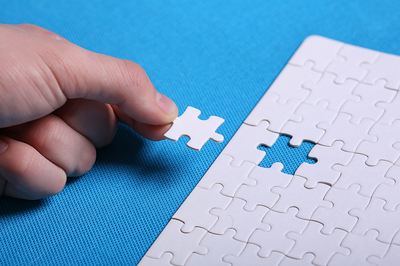Approximately one out of three depressed people also suffer from some form of substance abuse or dependence, according to Mental Health America. While dealing with depression is never easy, it is further complicated by the co-occurrence of addiction. The good news is that proper treatment for both issues can help people overcome these challenges and recover their lives. Here’s a closer look at the double-sided coin of depression and addiction, along with how targeted treatment programs can help.

Simultaneously treating co-occurring disorders may be an important piece of the recovery puzzle.
About Co-Occurring Disorders
Addiction does not exist in a vacuum. Rather, it exists in a real-world context in which a multitude of factors—including mental health issues such as depression, anxiety, and bipolar disorder—come into play.
Says the National Council on Alcoholism and Drug Dependence (NCADD) of the phenomenon of co-occurring disorders: “In a dual diagnosis, both the mental health issue and the drug or alcohol addiction have their own unique symptoms that may get in the way of your ability to function, handle life’s difficulties, and relate to others. To make the situation more complicated, the co-occurring disorders also affect each other and interact. When a mental health problem goes untreated, the addiction problem usually gets worse as well. And when alcohol or drug abuse increases, mental health problems usually increase too.”
Understanding Co-Occurring Disorders
While addiction and mental health issues are often interlinked, it is important to note that neither directly causes the other. Rather, they are “bidirectional,” meaning that people who suffer from depression are more likely to abuse substances, and people who abuse substances are more likely to suffer from depression. Furthermore, each can certainly contribute to the extent to which the other impacts the lives of individuals.
For starters, people living with depression or anxiety may use drugs or alcohol to self-medicate their symptoms. Over time, however, they may require more and more of these substances to find relief. At the same time, they may also begin to experience dangerous side effects.
Additionally, using drugs and alcohol can cause symptoms of depression and other mental health disorders to worsen. In other words, while these substances may not cause mental health problems, they can exacerbate existing symptoms or trigger new ones. Drugs and alcohol can also mitigate the effects of certain medications used to treat depression, anxiety, and bipolar disorder, thereby lessening their effectiveness.
Lastly, drug and alcohol abuse can lead to an increase in underlying risk for depression and other mental disorders. While scientists are still identifying what leads to mental health problems, research indicates that they are caused by a combination of factors, including genetics and the environment. The takeaway? In the case of people who are already at risk for mental disorders due to their genetics, drug or alcohol abuse may tip the scale.
Treating Co-Occurring Disorders
One thing mental health issues and addiction have in common is that they can both be difficult to diagnose for a common reason: denial.
Explains NCADD: “Denial is common in alcoholism and drug dependence. It’s hard to admit how dependent one is on alcohol or drugs or how much they affect a person’s life. Denial frequently occurs in mental disorders as well. The symptoms of depression or anxiety can be frightening, so a person may ignore them and hope they go away. Or one may be ashamed or afraid of being viewed as weak if the problem is addressed.”

Cognitive behavioral therapy is an effective psychological treatment for both depression and addiction.
However, the cold hard truth is that neither depression nor addiction will go away on its own. In fact, they will only get worse. The typical result of ignoring or denying these problems is a life-threatening downward spiral. Conversely, treatment programs that use an integrated approach when it comes to acknowledging and treating co-occurring disorders are more likely to get to the root of the problem.
As with all substance abuse programs, the most successful course of treatment will be an individualized one. Reveals Psycom: “Some with a dual diagnosis can cope well with counseling, medical support, and peer support for addiction. Others may find that intensive inpatient or outpatient treatment programs work best. Effective treatment programs typically utilize peer support (often in the form of group counseling), individual counseling, pharmacotherapy, individualized treatment plans, on-site medical assistance, family involvement, and follow-up support to prevent relapse. While relapse may and often occurs, people generate the greatest odds for long-term recovery when they treat both the depression and the substance use.”
We’re Here to Help
If want to support a loved one in breaking the cycle of depression and addiction and regaining control over their lives, Harris House can help. This reputable St. Louis rehab program has been facilitating recovery for people with co-occurring disorders for more than 50 years. Call us today to learn about admissions.








